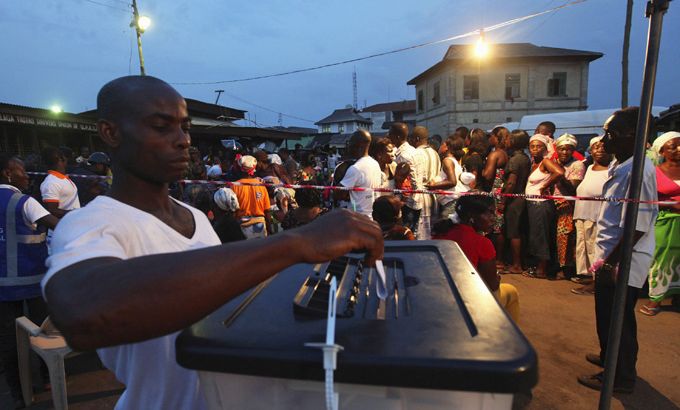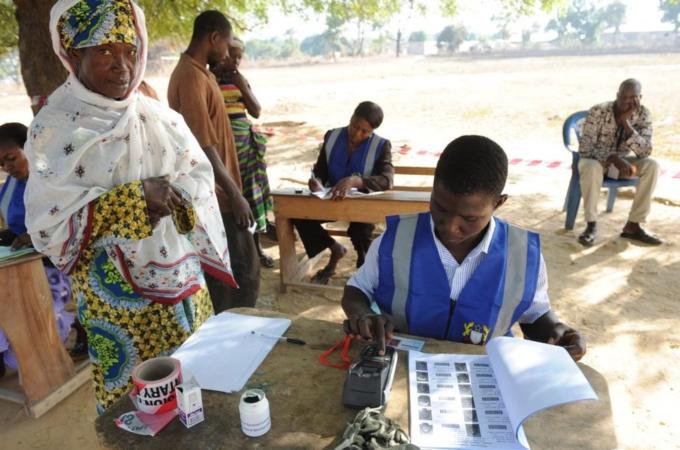Ghana extends voting after technical glitches
Voting continues on Saturday after technical hitches forced authorities to extend voting in some areas.

Exhausted Ghanaians have queued up for a second day to cast their ballots in presidential and parliamentary elections after technical problems prevented thousands of people in the West African nation from casting their ballots on time.
The decision was broadly accepted by Ghanaians who hope the poll will burnish their country’s reputation as a bulwark of democracy and progress in a region better known for civil wars, coups and corruption.
Keep reading
list of 4 items‘Triple spending’: Zimbabweans bear cost of changing to new ZiG currency
Boeing hit with 32 whistleblower claims, as dead worker’s case reviewed
US imposes new sanctions on Iran after attack on Israel
“People who lined up to vote today but were unable to do so will be able to cast their ballot tomorrow,” Election Commissioner Kwadwo Afari-Gyan said on Friday. Polling stations would reopen at 7:00am (07:00 GMT), he said.
Many newly introduced electronic fingerprint readers, used to verify people’s identities, malfunctioned on Friday, slowing voting and creating long lines at polling stations nationwide that could not be cleared.
“We have been standing here for five hours. Our line is not moving,” Alice Hayford, a 44-year-old market trader in an Accra polling station suffering from a malfunctioning biometric scanner said.
Materials also arrived late in some areas, causing some polling stations to open far behind schedule in Ghana’s sixth consecutive presidential and parliamentary elections since the country returned to democratic rule in 1992.
There were rowdy crowds in some areas, but local observers said they had
not received reports of any major incidents.
Tight race
Even with eight contenders, the race between John Dramani Mahma, the incumbent, and Nana Akufo-Addo, his main competitor, was considered to be too close to call.
 |
| About 14 million people were registered to vote at 26,000 polling stations [AFP] |
Results are expected within two days of polls closing. A second round will be held on December 28 if no one wins a majority of the vote.
Both leading candidates are trying to make the case that they will use the nation’s newfound oil wealth to help the poor, with commercial oil production that began in 2010 set to expand.
Mahama, the 54-year-old president from the National Democratic Congress party, only took power in July, when his predecessor John Atta Mills died following an illness.
Many voters are expecting to see a faster improvement in their daily lives given recent economic growth – 14 per cent in 2011 and a projected eight per cent in 2012 and 2013, according to World Bank estimates.
Mahama, who cast his ballot in his home town of Bole, said this election will “consolidate Ghana’s democratic credentials once and for all. After we go through this, I believe there will be no doubt, no questions, about the factthat Ghana is a leading democracy in Africa”.
With one of the fastest growing economies in the world, corruption allegations against the ruling party are rife.
‘Born into privilege’
Akufo-Addo, Mahama’s main challenger from the New Patriotic party, lost by less than one percentage point in 2008, and says he is poised to reverse that narrow defeat.
In an interview on the eve of the vote, Akufo-Addo told the AP news agency the first thing he will do if elected is begin working on providing free high school education for all.
“It’s a matter of great concern to me,” he said, adding that he plans to use oil wealth to educate the population, industrialise the economy and create better jobs.
Though the British-educated 68-year-old son of a former president is seen as having come from privilege, he is favoured by the many of the younger generation in Ghana.
“The idea that merely because you are born into privilege that automatically means you are against the welfare of the ordinary people, that’s nonsense”, the former foreign minister said.
All candidates have signed a peace pact and have promised to accept the results of Friday’s poll which also sees voters choosing a new 275-seat parliament.